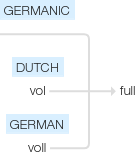Full
Old English, of Germanic origin; related to Dutch vol and German voll .
wiktionary
From Middle English ful, from Old English full(“full”), from Proto-West Germanic *full, from Proto-Germanic *fullaz(“full”), from Proto-Indo-European *pl̥h₁nós(“full”).
Germanic cognates include West Frisian fol, Low German vull, Dutch vol, German voll, Danish fuld, and Norwegian and Swedish full (the latter three via Old Norse). Proto-Indo-European cognates include English plenty (via Latin, compare plēnus), Welsh llawn, Russian по́лный(pólnyj), Lithuanian pilnas, Persian پر (por), Sanskrit पूर्ण(pūrṇa). See also fele.
From Middle English fulle, fylle, fille, from Old English fyllu, fyllo(“fullness, fill, plenty”), from Proto-Germanic *fullį̄, *fulnō(“fullness, filling, overflow”), from Proto-Indo-European *plūno-, *plno-(“full”), from *pelh₁-, *pleh₁-(“to fill; full”). Cognate with German Fülle(“fullness, fill”), Icelandic fylli(“fulness, fill”). More at fill.
From Middle English fullen, fulwen, from Old English fullian, fulwian(“to baptise”), from Proto-Germanic *fullawīhōną(“to fully consecrate”), from *fulla-(“full-”) + *wīhōną(“to hallow, consecrate, make holy”). Compare Old English fulluht, fulwiht(“baptism”).
From Middle English[Term?], from Old French fuller, fouler(“to tread, to stamp, to full”), from Medieval Latin fullare, from Latin fullo(“a fuller”).
etymonline
full (adj.)
Old English full "containing all that can be received; having eaten or drunk to repletion; filled; perfect, entire, utter," from Proto-Germanic *fullaz "full" (source also of Old Saxon full, Old Frisian ful, Dutch vol, Old High German fol, German voll, Old Norse fullr, Gothic fulls), from PIE root *pele- (1) "to fill." Related: Fuller; fullest.
The adverb is Old English ful "very, fully, entirely, completely" and was common in Middle English (full well, full many, etc.); sense of "quite, exactly, precisely" is from 1580s. Full moon, one with its whole disc illuminated, was Old English fulles monan; first record of full-blood in reference to racial purity is from 1812. Full house is 1710 in the theatrical sense, 1887 in the poker sense (three of a kind and a pair, earlier full-hand, 1850). Full-dress (adj.) "appropriate to a formal occasion" is from 1761, from the noun phrase.
full (v.)
"to tread or beat cloth to cleanse or thicken it," late 14c., from Old French foler, fouler "trample on, press," from Latin fullo "fuller, launderer," also a kind of beetle, a word of unknown etymology. Perhaps the Middle English word was from Old English agent-noun fullere, which probably was formed from Latin fullo with a native ending.
full (n.)
early 14c., from Old English fyllo, fyllu "fullness (of food), satiety;" also from full (adj.).
